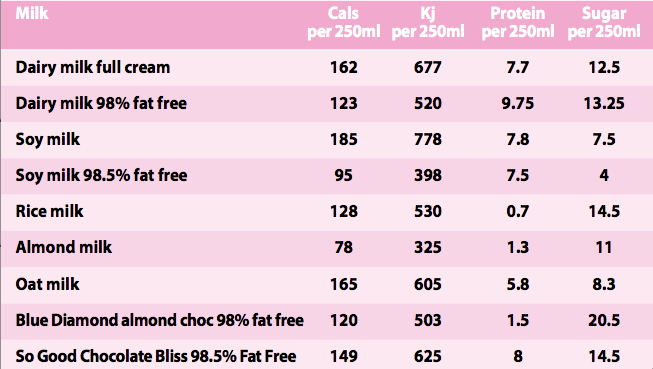
Dairy milk seems to be the first port of call for adding into smoothies and whilst dairy milk is without doubt the most common milk and also packs a nutritional punch there are also lots of other choices such as Rice Milk, Soy Milk, Oat Milk or Almond Milk so you don’t have to have dairy milk if you choose not to.
Many people can also have an intolerance to dairy milk or if you are breastfeeding many mums find that their baby can have an intolerance to dairy and it can make colic symptoms worse, so it may be best to eliminate it from your diet.
But if you and your bub do not have a dairy intolerance then low fat dairy milk is fine to use if you prefer to use it.
If you are using a soy or rice milk, always make sure to buy a non genetically brand as soy and rice are one of the most highly sprayed food with pesticides that there is so always go non GM – and please note that our Healthy Mummy products are all non genetically modified. We also suggest buying a brand fortified with calcium.
Soy Milk (GMO Free)
Gluten, lactose and cholesterol free. The light variety provides less than half the calories of the full strength variety. Soy milk is not naturally high in calcium but there are many brands that do fortify their milks with calcium. If you drink soy milk, it is advisable to choose a calcium-fortified brand to ensure your daily calcium intake is adequate.
Almond Milk
If you’re counting calories, almond milk tends to be quite a bit lower in calories and sugar than most of the other non-dairy milks. It also contains monounsaturated fats, which are the same heart-healthy fats found in olive oil. Almond milk is fairly low in protein compared with cow’s milk though, so it won’t keep you as satisfied for long periods of time – unless you can buy a protein enriched one.
Coconut Milk
Gluten and lactose free, low in carbs at only 3.7g per 100ml, but very high in calories as the fat content is quite high at around 467 calories per cup – aim for low fat coconut milk or mix the full strength variety with water for a calorie controlled beverage.
Coco Quench (Pure Harvest)
Coco Quench is a finely balanced drink with a full bodied taste. The fats from the coconut complement the sweetness and sugars found in rice milk, while the complex carbohydrates in brown rice reduce the richness and high fat profile that is typical of coconut milk. Coco Quench is an excellent drink for young children and is also a great healthy option for people looking to reduce their saturated fat intake.
Rice Milk
Low in saturated fat and cholesterol free. It is also one of the lowest allergenic foods available, being lactose, gluten and dairy free. On the negative it is naturally lower in protein and calcium in comparison to regular milk. If you are choosing rice milk, choose a variety that has been fortified with calcium and protein. Rice milk is not recommended for children due to its low protein and calcium content. Overall rice milk is higher in sugar than most other milk replacements.
Oat Milk
Oat Milk is a source of soluble fibre at around 4g per serving. It has no added cane sugar and it is cholesterol free. A great milk alternative if you have poor digestion or suffer from bloating and constipation.
Lactose Free Milk
Lactose-free milk is designed for people with lactose intolerance. Lactose is a naturally occurring sugar found in dairy foods. It is normally broken down or digested by the body using an enzyme called lactase. However, people with lactose intolerance don’t have enough of this enzyme to properly digest lactose, resulting in lactose intolerance. Lactose-free milk has been processed to break down the lactose before packaging, making it a suitable type of milk to drink by people who are lactose intolerant.
Goat’s Milk
Easier to digest than cow’s milk due to the smaller protein and fat molecules, its low carb at 3.8g per 100ml, but it does have an acquired taste. Goat’s milk is a good source of protein, contains less sugar (lactose), 13% more calcium, 25% more vitamin B6, 47% more vitamin A, and 134% more potassium than regular cow’s milk.
A2 Milk
Milk labelled as ‘A2 milk’ contains mainly the A2 type of beta-casein. The milk we currently buy in supermarkets and known as ‘regular milk’ contains a mixture of A2 and A1 beta casein (about 60% A2 and 40% A1). To date, there is no solid scientific evidence demonstrating that A2 milk is better for you than regular milk. Most people do notice the ‘difference’ when switching to A2 milk as it seems to be easier to digest causing less bloating than regular cow’s milk.
Organic Milk
With so many synthetic food additives, antibiotics, pesticides and hormones added to our food these days, a lot of people prefer to buy organic milk to help live a more pure life. The down side is that the nutritional content is not proven to be any different, and it does cost around double that of regular milk. On the up side it’s guaranteed to be clear of hormones and that could definitely make a difference to your waistline.

